2024 PARIS SUMMER OLYMPIC GAMES
- Pool Swimming: July 27 – August 4, 2024
- Open Water Swimming: August 8 – 9, 2024
- La Défense Arena — Paris, France
- LCM (50 meters)
- Meet Central
- Full Schedule
- SwimSwam Preview Index
- Entry Lists
Note: For our top nations’ aggregate times below, the first column (Season-Best) is the sum of each leg’s best flat-start time during the qualifying period, not factoring relay starts. The second column is a little more predictive, pulling that athlete’s best time or split (that we could find) during the qualifying period. If the athlete’s best is from a flat start, we’ve used that over their fastest relay split. The presumptive leadoff swimmer of each relay is listed first with their flat-start best, followed by three with relay splits unless otherwise noted.
By The Numbers — Men’s 400 Freestyle Relay
- World Record: 3:08.24 — United States (M. Phelps, G. Weber-Gale, C. Jones, J. Lezak) (2008)
- World Junior Record: 3:15.49 — United States (D. Diehl, M. Williamson, H. Williams, J. Zhao) (2023)
- Olympic Record: 3:08.24 — United States (M. Phelps, G. Weber-Gale, C. Jones, J. Lezak) (2008)
- 2020 Olympic Champion: United States (C. Dressel, B. Pieroni, B. Becker, Z. Apple) — 3:08.97
The men’s 400 freestyle relay always brings fireworks at the Olympics.
It’s responsible for perhaps the most famous moment in American swimming history when Jason Lezak caught the French in the final 50 meters with a 46.06 split that’s still the fastest of all time, saving Michael Phelps‘s quest for eight Olympic golds in Beijing. Four years later, the French returned the favor by running down the Americans for gold. And that’s just 2008 and 2012, looking through the history books extends the dramatic legacy of this race, from the Australians beating the Americans in 2000 to South Africa’s upset in 2004.
This year should be no different.
The Recent World Champions
The Americans won gold in Tokyo in a time of 3:08.97, the third-fastest in history behind only the U.S. and France in that epic 2008 race. Since then, the winning times at this quad’s World Championships have gotten progressively slower. It took 3:09.34 to win at the 2022 Worlds, 3:10.16 in 2023, and 3:11.08 in 2024. Expect that winning time to come crashing back down in Paris with all teams hopefully firing on all cylinders.
United States (Defending Olympic Champions, 2022 World Champions)
| Swimmer | Fastest Flat-Start, Qualifying Period | Swimmer | Fastest Split, Qualifying Period | |
| Jack Alexy | 47.08 | Caeleb Dressel | 47.53 | |
| Chris Guiliano | 47.25 | Chris Guiliano | 47.25 (flat start) | |
| Caeleb Dressel | 47.53 | Hunter Armstrong | 47.59 (flat start) | |
| Hunter Armstrong | 47.59 | Jack Alexy | 47.00 | |
| 3:09.45 | 3:09.37 |
The Americans threw the gauntlet down at the U.S. Olympic Trials when the top six men in the 100 freestyle final broke 48 seconds. It was a close race that ultimately saw younger swimmers Jack Alexy and Chris Guiliano prevail over defending Olympic champion Caeleb Dressel.
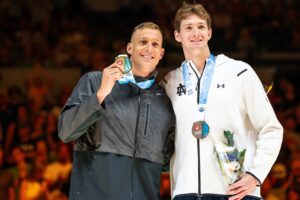
Caeleb Dressel, Chris Guiliano (photo: Jack Spitser)
Despite Dressel missing the individual event, it’s hard not to put him down as the lead-off swimmer. He’s been consistently improving since his comeback to the sport and has a history of getting faster from Trials to the big meet. Putting Dressel first allows the Americans to take advantage of Dressel’s start and gives them experience on the lead-off leg ahead of a relatively young relay.
For every team, the relay on night one could go two ways: everyone will be fresh which could prompt fast swims but first-time Olympians could have the jitters in their first Olympic final. And with the relay on night one, coaches must rely only on training camps and prelims efforts to decide who is swimming well. Dressel provides a steady presence on this relay who, in an ideal world for the Americans, sets a calm and confident tone for the other three swimmers.
Adding up the more predictive relay brings the Americans’ time down to 3:09.37. There’s room for improvement as well; Dressel can be faster and after a 47.08 at U.S. Olympic Trials, Alexy can likely pop a sub-47 anchor leg. He swam multiple 100 free splits in Fukuoka, peaking at 47.00. The United States is seeded third heading into the Games but given that their cumulative time is over a second ahead of the next fastest nation (Australia) and still has room for improvement they are the favorites for this race.
Australia (2023 World Champions)
| Swimmer | Fastest Flat Start, Qualifying Period | Swimmer | Fastest Split, Qualifying Period | |
| Kyle Chalmers | 47.15 | Jack Cartwright | 47.84 | |
| Flynn Southam | 47.77 | Flynn Southam | 47.57 | |
| Jack Cartwright | 47.84 | William Yang | 48.08 (flat start) | |
| William Yang | 48.08 | Kyle Chalmers | 46.56 | |
| 3:10.84 | 3:10.05 |
The first thing the Australian Olympic coaches will do is put Kyle Chalmers in the anchor spot. He’s been consistently clutch for years in that role, pulling them onto the podium on the back of some truly impressive performances. He owns four of the 10 fastest relay splits in history. Most recently, he dropped a 46.56 during the 2023 World Championships, propelling the Australians from third at 300 meters to their first world title in the event since 2011.
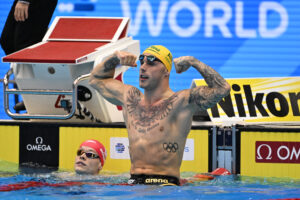
Kyle Chalmers. Photo: Fabio Cetti.
It wasn’t just Chalmers who put the Australians on the top step of the podium, though. The other three men on that relay–Jack Cartwright, Flynn Southam, and Kai Taylor–all stepped up as well. For the first time since 2011, Australia had all sub-48 swims on their relay, a streak that they’ll need to keep alive to maintain a spot on the podium. Only Chalmers was sub-48 at the Australian Olympic Trials so they’ve got work to do. However, William Yang claimed second in a lifetime best of 48.08 less than a year after undergoing back surgery for a benign tumor, giving hope that he can do his part as an addition to the squad from the 2023 Worlds team.
This is another young relay as all of the top four Chalmers are making their Olympic debut. But as you can see from the predictive column, there is certainly room for the quartet to drop from their flat start add-up. Depending on how prelims go, the Australians also have the option to bring on either Taylor or Zac Incerti. Both have a faster lifetime best than Cartwright; Taylor was 48.37 in April of this year and Incerti brings Olympic experience as well as a 48.51 lifetime best.
Those difficult decisions will be made after prelims. But as long as the first three finals swimmers keep the race close, Australia will always have a chance for the win–and certainly a podium–with Chalmers anchoring.
China (2024 World Champions)
| Swimmer | Fastest Flat-Start, Qualifying Period | Swimmer | Fastest Split, Qualifying Period | |
| Pan Zhanle | 46.80 | Pan Zhanle | 46.80 | |
| Wang Haoyu | 47.89 | Chen Juner | 47.85 | |
| Chen Juner | 48.13 | Ji Xinjie | 48.18 | |
| Ji Xinjie | 48.26 | Wang Haoyu | 46.97 | |
| 3:11.08 | 3:09.80 |
There will be two races during the men’s 400 free relay. First, there’s the race for gold in the relay. But there’s also the lingering question about whether someone will break the world record leading off the relay. If the 100 freestyle world record is going to go down in Paris, it’s most likely to happen here. Many of the event’s fastest stars are on anchor duties or aren’t in the relay, leaving Pan Zhanle as the most likely candidate for that feat.
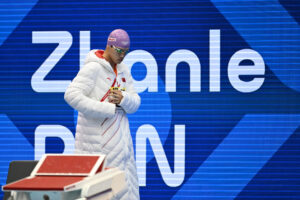
Pan Zhanle. Photo: Fabio Cetti
At the 2024 World Championships, Pan exploded, leading off this relay in 46.80 to break the world record and lead the Chinese squad to gold (3:11.08). He lowered David Popovici‘s mark by six-hundredths and the two are now tied for most sub-47 swims in history thanks to Popovici’s 46.88 at the 2024 European Championships.
Even if Pan misses the world record, there is a solid chance that China will have the lead at the first exchange. If all four members of this relay can all fire at the same time, particularly Pan and Wang, they are capable of backing up their win from a lacking 2024 Worlds field with Olympic gold. If Chen and Ji don’t get lost in the wash, two 46s from Pan and Wang could be too much for another team to overcome.
There are a lot of ifs for this squad which makes placing them tricky. They have a strong case for gold if all four swimmers step up, but there is not much room for error in this field where all the other medal contenders have at least one strong veteran and swimmer capable of a 46 split themselves. The argument for them winning it all is as valid as the one for them missing the podium.
A Model of Consistency (Italy)
| Swimmer | Fastest Flat-Start, Qualifying Period | Swimmer | Fastest Split, Qualifying Period | |
| Alessandro Miressi | 47.54 | Alessandro Miressi | 47.54 | |
| Thomas Ceccon | 47.98 | Manuel Frigo | 47.79 | |
| Leonardo Deplano | 48.09 | Lorenzo Zazzeri | 47.99 | |
| Manuel Frigo | 48.25 | Thomas Ceccon | 47.03 | |
| 3:11.85 | 3:10.35 |
Italy earned their first medal in this event at the Tokyo Games, taking silver with a national record 3:10.11. Since then, it has consistently found its way onto the podium in this event. The makeup of the relay has not changed much either, as coaches have stuck with Alessandro Miressi, Manuel Frigo, Lorenzo Zazzeri, and Thomas Ceccon. This quartet earned silver in Tokyo, bronze in Budapest, and silver in Fukuoka. They missed Ceccon in Doha but Miressi, Zazzeri, Frigo, and Paolo Conte Bonin won silver in Doha.
They are reliable threats for the medals but have yet to strike gold. When this squad earned silver in Tokyo, they were able to have four 47s, which hasn’t happened since, even as they approached their national record with a 3:10.49. In a world where swimmers in this field are consistently swimming 46-point splits, Italy needs one of their own if they are going to maintain their grip on the podium. Ceccon neared the barrier in 2023, splitting 47.03 to hold on for silver as Chalmers passed him for the gold.
Consistency has been their strength in this quad, which makes it likely that though Leonardo Deplano has a faster best during the qualification period, they will still turn to Zazzeri for the finals relay unless Deplano has a huge swim in the morning. They can count on the 100 free Italian record holder Miressi for a 47-mid/high lead-off and Ceccon has been a reliable anchor for them.
But for them, consistency could prove to be a double-edged sword; if they want gold, they need at least one of their swimmers to break out from consistency and put together a huge swim in the final. That said, they are a reliable option for the podium, especially with
Out For Revenge (Great Britain)
| Swimmer | Fastest Flat-Start, Qualifying Period | Swimmer | Fastest Split, Qualifying Period | |
| Matt Richards | 47.45 | Matt Richards | 47.45 | |
| Duncan Scott | 47.92 | Jacob Whittle | 48.03 (flat start) | |
| Tom Dean | 47.94 | Tom Dean | 47.94 (flat start) | |
| Jacob Whittle | 48.03 | Duncan Scott | 47.37 | |
| 3:11.34 | 3:10.79 |
If there’s any nation in the field with something to prove, it’s Great Britain. They’ve never won a medal in the men’s 400 free at the Olympic Games, a streak which got extended by them missing the Tokyo final by four-hundredths and settling for a disappointing 9th place finish (3:13.17). They rebounded at the 2022 Worlds by taking 4th and setting a national record of 3:11.14.
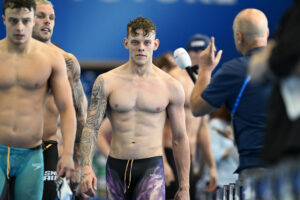
Matt Richards. Photo: Fabio Cetti.
But a year later, they were once again left with a bitter taste in their mouths. After posting what seemed to be the top time in Fukuoka prelims (3:10.47) they were disqualified for a bad relay exchange. That swim would’ve been a new national record and was highlighted by a 46.95 split from Matt Richards. So not only did it feel like they left a lot on the table, but it also forced Richards, Jacob Whittle, Tom Dean, and Duncan Scott to go to the 2024 World Championships to qualify for the relay for the Olympics. They did so calmly with a 3:12.55 for 4th place and it’s hard not to feel like this relay has only scratched the surface of its potential.
As Richards is now the British record holder in the 100 free, it seems likely that he leads off. Whittle holds a 48.03 flat start PB from December 2023 but was 47.37 on the disqualified relay (though he was the one who jumped early). And, they’ve got a lethal back half in Dean and Scott. It’s hard to resist Scott in the anchor leg; it’s a role that’s consistently fallen to him and he’s excellent at it. He owns the second-fastest split in history with a 46.14 from the 2019 World Championships. But Dean proved he’s a more than capable anchor as well during a busy 2022 season. Scott withdrew from Worlds after contracting COVID-19 and Dean stepped into the anchor role with 47-mid splits which he improved with two 46 splits (46.70, 46.95) for England at the Commonwealth Games.
There isn’t a bad option for Great Britain on the anchor leg as this relay looks to finally unleash its full potential. The Olympics are the perfect moment for that. If they safely make their way into the final, they can claim their first Olympic medal in this event.
Aiming For An Upset
France
Highlighted by Maxime Grousset‘s 47.33 flat start, the French are hoping to get the home crowd amped up early in the meet by getting back on the podium after their streak was snapped at three in Tokyo. It’s a tall task for them and it’s uncertain what form Rafael Fente-Damers will be in after dislocating his shoulder celebrating at French Championships. But they’ve also got a renewed Florent Manaudou, who swam 47.90 for his first personal best in the event since 2015.
Canada
Canada’s presumed quartet is constructed similarly to the French squad, except without the second sub-48. Josh Liendo leads the way for Canada with a 47.55 flat start. Look for the team to take advantage of Liendo’s speed by opening with him. Then, they’ll turn to Yuri Kisil (48.19), Finlay Knox (48.29), and Javier Acevedo (48.50). They need some big splits from those three if they want to win Canada’s first Olympic medal in this event. Liendo and Kisil were part of the Tokyo team that just missed fulfilling that dream in Tokyo with a 3:10.82 national record for 4th place, .60 seconds off the podium.
Serbia
Velimir Stjepanovic, Nikola Acin, Justin Cvetkov, and Andrej Barna combined to win this event at the 2024 European Championships, posting a 3:12.90 national record. That time would have made finals in Tokyo and Fukuoka. They’ve been a part of World Championship finals in Budapest and Fukuoka and now that they’ve finally broken through 3:13-high, look set to take the next step by making the Olympic final.
Hungary
Hungary also set a national record in Tokyo, taking 5th in 3:11.06. Nandor Nemeth, Szebasztian Szabo, and Kristof Milak all return from that relay with Hubert Kos owning the fourth-fastest flat start in the qualification window. Milak’s form is a big question mark, but this relay will serve as an early data point. He’s got a best of 48.26 during the qualification period, but we’ve seen him be much faster including a 46.89 anchor at 2022 Worlds.
The Verdict
Even if there are no other fireworks on night one, count on this race to bring the drama. The United States are the favorites after their Olympic Trials but nothing is set in stone. The question of a 100 free world record looms, and something like that could power China to the gold.
Drama could happen in the morning too and a country like Spain, Brazil, or Germany stun one of the bigger powers in this field. Spain also made the 2023 Worlds final and like these other nations, will be all out in the morning.
In Tokyo, the U.S. finished well ahead of the field in 3:08.97, but it still took a 3:10.22 to medal. Canada’s 3:10.82 missed the podium. We expect it to take a similar time (3:10-low) to make the podium in Paris. Of the favorites, the only two to not break 3:11 are China and Great Britain (though the Brits were well under in their DQed relay).
We’ve opted to predict the United States to defend Olympic gold. It’s chaos after that, though. China has the highest ceiling of the remaining favorites: Australia, Italy, and Great Britain. And whether you rank them on the podium or off, it’s a bold call. Italy hasn’t missed an LCM podium this quad and the only reason Australia has is because they didn’t field a team in Doha. Great Britain has revenge on its mind–a strong motivator powering a strong squad.
We’ve made our choice, make yours in the comments.
SwimSwam’s Picks
| Place | Nation | Entry Time | Predictive Add Up |
| 1 | United States | 3:10.81 | 3:09.37 |
| 2 | Great Britain | 3:12.55 | 3:10.79 |
| 3 | Australia | 3:10.16 | 3:10.05 |
| 4 | Italy | 3:10.49 | 3:10.35 |
| 5 | China | 3:11.08 | 3:09.80 |
| 6 | Canada | 3:12.05 | 3:12.53 |
| 7 | France | 3:14.54 | 3:11.99 |
| 8 | Serbia | 3:13.88 | 3:12.90* (2024 Euros relay) |
Dark Horse: Brazil — Brazil boasts a quartet of strong sprinters. Marcelo Chierighini, Gui Caribe, Gabriel Santos, and Breno Correia aren’t to be overlooked. Together, they combine for a flat start add-up time of 3:13.27. A slightly different group featured in the 2023 Worlds final and took 6th in 3:12.71. If any of the countries we have in the top eight make a mistake in prelims, Brazil can and will take advantage.
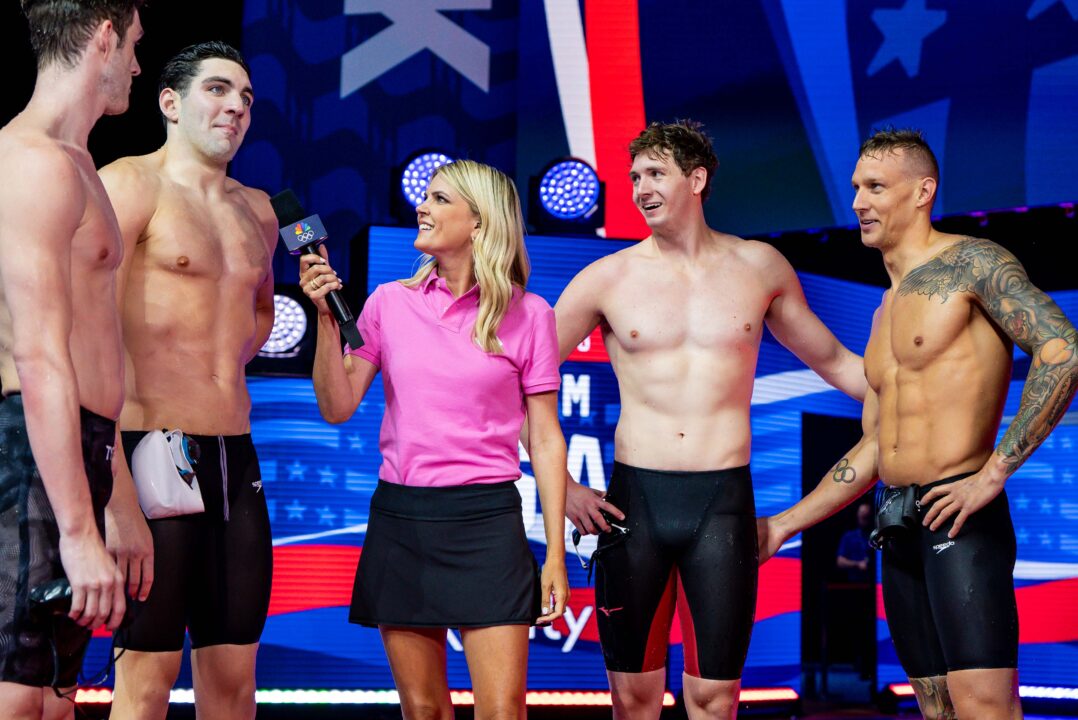
This addup times are mess..either use flat start time for all teams or don’t..how it make use for a comparison
For prelims they would go with completely new team, Curry Peroni Held and King..but final line up is crucial..
Alexy should lead of as he is the current fastest starter..( dressel is no more the best starter, now he had become a fast closer)..
Dressel should go second. After breaking WR in 100 fly, dressel went 46.9 on mixed medley anchor..so rested him can go 46.7 or better..
Guliano should go as third..at fukuoka Guliano had the fastest 3rd leg and he closed the gap that held created. Alexy touched the wall as 6th and Guliano gave the lead for matt King as second only 0.03 behind Italy.
Armstrong should bring the USA home, the slowest among the four,… Read more »
Does Romania have a relay team?
Why using Yang’s flat start 48 instead of Kai Taylor’s 47.5 relay split? Sub that in and Australia’s only 0.09 behind USA’s add ups
And while we’re at it if you’re going to use Dean’s flat start then you should use Richards’s 46.89 split instead of his flat start 47.45. That drops them 0.56.
Best line I read in an Australian article talking about relay predictions and add up times: “The problem with paper is that once it gets wet it’s pretty useless.” – Simon Smale
Got roughly the same in the Top 5 but with China winning silver. Xinjie Ji split a 47.86 in the mixed 400 Relay, and two 46 high and two 47 high legs gives them a bit more margin for error than the other contenders.
GB probably has the highest ceiling out of any non-American team as Richards, Scott, and Dean have the potential to split 46 and Whittle has the potential to split 47 low, it’s just about whether they peak at the same time.
Also I think the US have a great chance to break the record. Dressel might split 47.3-5 on the lead-off, and then with how Alexy and Guiliano have been swimming, there is a 46 mid-to-high swim given how fast they’ve been from a flat start
Also we’ve seen how relay starts tend to favor back-half swimmers in the past (Scott, Lezak, Chalmers, Apple) and it leads me to believe that Hunter Armstrong could possibly crack 47 given he was faster than Apple at trials and how much faster Apple was on relay legs. And that should be enough to crack the record.
47.3 + 46.7 + 46.7 means you need a 47.3(?) for the 4th guy. That WR is tough
Moreso an Armstrong projection than anything. Zach Apple split 46 high last year and Armstrong has a faster flat start PB. It’s more of a hot take than anything, but three 46 relay legs should be able to do the job, though admittedly 46.0 is a lot of ground to make up.
Gold – USA
Then take your pick from the rest, total bun fight
Is there any word on the recovery for the French youngster who placed 2nd and then broke his arm?
He’s fine, in great shape and ready to go